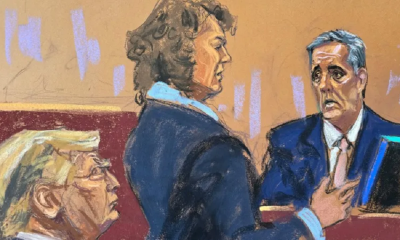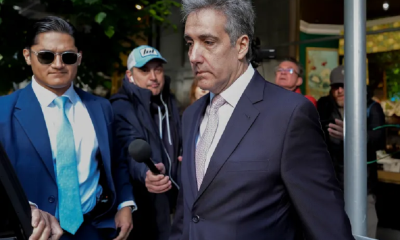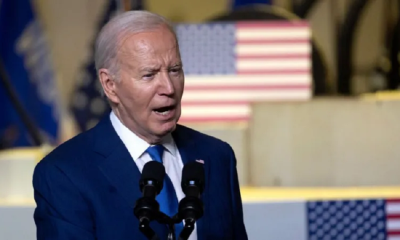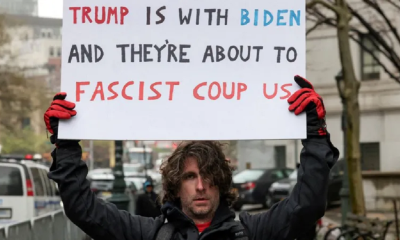Latest News
Biden and Trump set for election rematch after securing party nominations
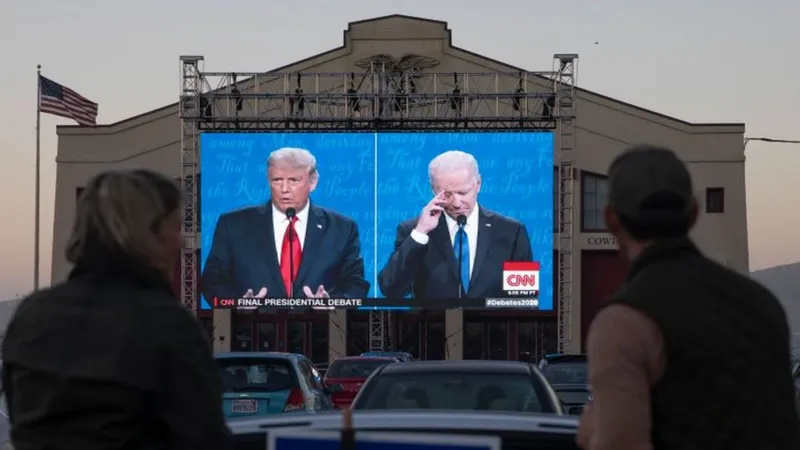
US President Joe Biden and his predecessor Donald Trump have both passed the delegate thresholds to clinch their parties’ nominations for the election in November.
Four states, one American territory and Democrats living abroad held their primaries on Tuesday. The result means US voters face a rematch of the 2020 presidential election in eight months’ time. The nominations will be made official at party conventions this summer.
The 81-year-old president said on Tuesday evening that he was “honoured” voters had backed his re-election bid “in a moment when the threat Trump poses is greater than ever”. Citing positive economic trends, he asserted the US was “in the middle of a comeback” but faced challenges to its future as a democracy, as well as from those seeking to pass abortion restrictions and cut social programmes. “I believe that the American people will choose to keep us moving into the future,” Mr Biden said in a statement from his campaign.
Incumbency gave Mr Biden a natural advantage and he faced no serious challengers for the Democratic nomination. Despite persistent concerns from voters that his age limits his ability to perform the duties of the presidency, the party apparatus rallied around him.
Meanwhile, Mr Trump, 77, remains very popular with the Republican voter base, which has propelled him to victory in primary after primary over well-funded rivals. His campaign for a second term in the White House has zeroed in on stricter immigrations laws, including a pledge to “seal the border” and implement “record-setting” deportations.
Mr Trump has also vowed to fight crime, boost domestic energy production, tax foreign imports, end the war in Ukraine and resume an “America first” approach to global affairs.
Tuesday night’s results do not come as a shock, as both men have dominated their races so far.
Both their re-nominations seemed all but predetermined, despite polling that indicates Americans are dissatisfied with the prospect of another showdown between Mr Biden and Mr Trump in November.
The US presidential primaries and caucuses are a state-by-state competition to secure the most party delegates
The Democrats and the Republicans have slightly different rules for their primaries, but the process is essentially the same.
Each state is allocated a certain share of party delegates, which are awarded either as a whole to the winning candidate or proportionally, based on the results.
A Republican candidate must secure at least 1,215 of their party’s delegates during the primary season to win their presidential nomination, while a Democrat must secure 1,968.
On Tuesday, Republicans held primaries in Mississippi, Georgia and Washington State, and a caucus in Hawaii.
Democrats, meanwhile, held primaries in the states of Georgia, Washington and Mississippi, as well as in the Northern Mariana Islands and for Democrats living abroad.
Mr Biden and Mr Trump’s main competitors had dropped out before Tuesday’s primary contests, so the results had been all but certain.
Former UN Ambassador Nikki Haley, Mr Trump’s last remaining rival, dropped out earlier this month after losing 14 states to Mr Trump on Super Tuesday.
Though several more states have yet to hold their primary contests, with Mr Trump and Mr Biden over the delegate threshold, the 2024 general election is now effectively under way.
The US presidential election will be held on 5 November 2024.
(BBC)
Latest News
Trump confirms talks with Iran as US military shoots down Iranian drone
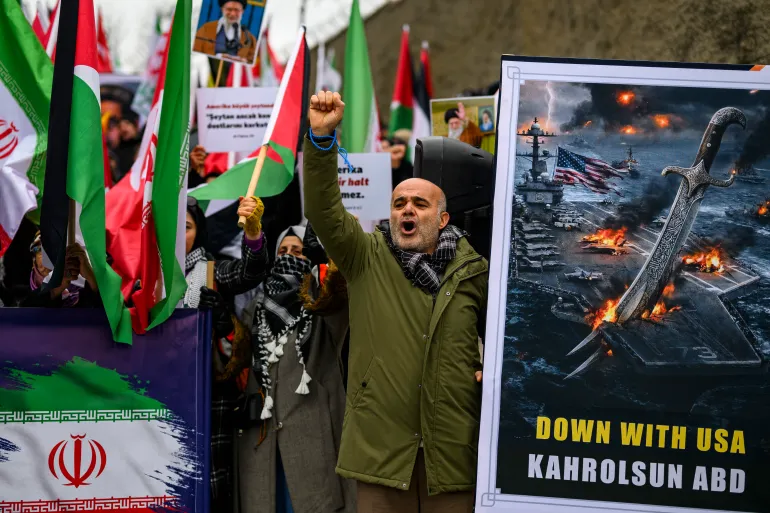
United States President Donald Trump has confirmed that talks with Iran are continuing to try to de-escalate tensions in the Gulf, even as the US military announced shooting down an Iranian drone that approached its aircraft carrier in the Arabian Sea.
Trump told reporters at the White House on Tuesday that Washington was negotiating with Iran “right now”, but declined to say where the talks were taking place.
“[The talks] are all over. But they are negotiating. They’d like to do something, and we’ll see if something is going to be done,” he said.
“They had a chance to do something a while ago, and it didn’t work out. And we did ‘Midnight Hammer’, I don’t think they want that happening again,” he added, referring to the operation last June in which the US Air Force and Navy struck three Iranian nuclear facilities.
Trump, who has been pushing Teheran to agree to talks over its nuclear programme, has repeatedly threatened to attack the country again over a recent crackdown on antigovernment protests. The US president sent the USS Abraham Lincoln to the Gulf last week, leading to fears of a possible military confrontation.
The carrier strike group, which brought roughly 5,700 additional US troops, joined three destroyers and three littoral combat ships that were already in the region.
Tensions have been easing in recent days amid a push by regional powers for a resolution.
Iranian President Masoud Pezeshkian said earlier on Tuesday that he had instructed the country’s foreign minister to “pursue fair and equitable negotiations, guided by the principles of dignity, prudence, and expediency”, provided that a “suitable environment exists”.
“These negotiations shall be conducted within the framework of our national interests,” Pezeshkian added
[Aljazeera]
Latest News
Seven million cancers a year are preventable, says report
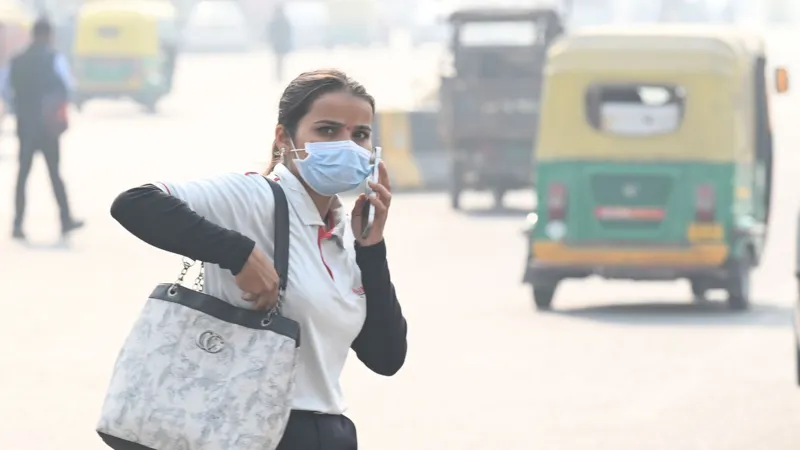
Seven million people’s cancer could be prevented each year, according to the first global analysis.
A report by World Health Organization (WHO) scientists estimates 37% of cancers are caused by infections, lifestyle choices and environmental pollutants that could be avoided.
This includes cervical cancers caused by human papilloma virus (HPV) infections which vaccination can help prevent, as well as a host of tumours caused by tobacco smoke from cigarettes.
The researchers said their report showed there is a “powerful opportunity” to transform the lives of millions of people.
Some cancers are inevitable – either because of damage we unavoidably build up in our DNA as we age or because we inherit genes that put us at greater risk of the disease.
But researcher Dr Isabelle Soerjomataram said “people are surprised to hear” that nearly four in 10 cancers can be prevented as it is “a substantial number”.
The International Agency for Research on Cancer, part of the WHO, analysed 30 preventable factors known to increase the risk of cancer.
These include smoking and ultraviolet (UV) radiation which can directly damage our DNA; obesity and too little physical activity which alter inflammation and hormones in the body to raise cancer risk; and air pollution which can wake up dormant cancer cells.
The agency’s report also looked at nine cancer-causing infections including HPV, hepatitis viruses which lead to liver cancer and the stomach bug H. pylori.
The team used data on cancer cases from 2022 and from the 30 risk factors a decade earlier – across 185 countries – to perform their statistical analysis.
The big three contributors to more than 18 million cancer cases around the world were found to be:
- smoking tobacco which caused 3.3 million cancers
- infections causing 2.3 million cancers
- alcohol use leading to 700,000 cancers
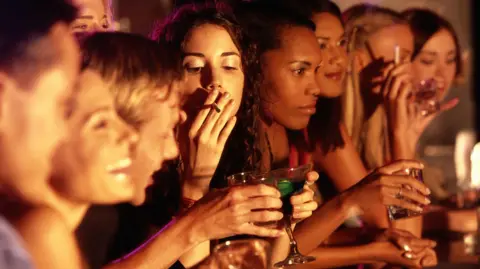
However, the overall figures mask a nuanced picture of cancer risk around the world.
There is a stark sex-divide with 45% of men’s cancers being preventable compared with 30% in women, partly down to higher levels of smoking among men.
In women living in Europe, the top three preventable causes of cancer are smoking, closely followed by infection and then obesity.
While in sub-Saharan Africa, infections dominate and account for nearly 80% of preventable cancers in women.
This means any measures to tackle these cancers would need to be tailored to each region or country.
“This landmark study is a comprehensive assessment of preventable cancer worldwide, incorporating for the first time infectious causes of cancer alongside behavioural, environmental, and occupational risks,” said Soerjomataram, the deputy head of the IARC Cancer Surveillance Unit.
“Addressing these preventable causes represents one of the most powerful opportunities to reduce the global cancer burden.”
The report, published in the journal Nature Medicine, showed lung cancer (linked to smoking and air pollution) stomach cancer (linked to H. pylori infection) and cervical cancer (linked to HPV infection) made up nearly half of all preventable cases of cancer.
Dr Andre Ilbawi, team lead for cancer control at WHO, said the study was “good news” as it showed something could be done and he pointed to the success of countries that have introduced policies to tackle smoking or vaccinate against HPV.
“The percentage of preventable cancers can change over time and our goal is to get it as close to zero as possible,” he said.
[BBC]
Latest News
Spain announces plans to ban social media for under-16s
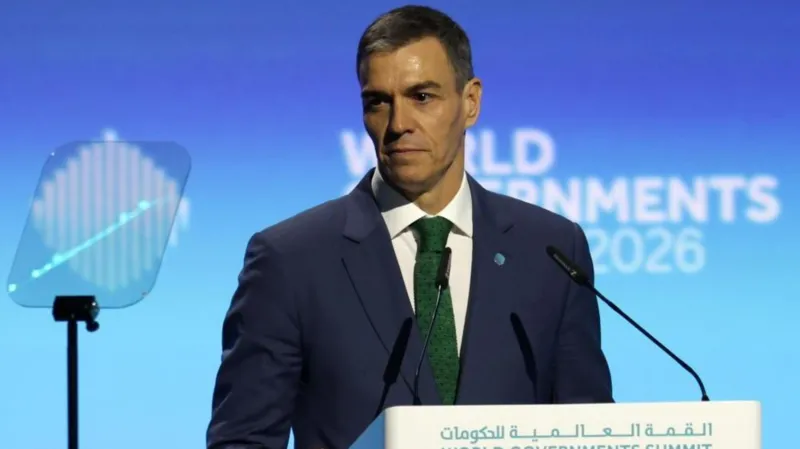
Spain has become the latest European country to make plans to ban social media for children under the age of 16.
“We will protect them from the digital Wild West,” Prime Minister Pedro Sánchez said at the World Governments Summit in Dubai on Tuesday.
The ban, which still needs parliamentary approval, is part of a raft of changes that include making company executives responsible for “illegal or harmful content” on their platforms.
Australia became the world’s first country to bring in a ban last year, with others watching – and judging – its success.
France, Denmark and Austria have also announced that they are considering their own national age limits.
The UK government has launched a consultation on whether to implement a ban for under-16s.
Social media companies have argued that the bans would be ineffective, difficult to implement and could isolate vulnerable teenagers. Reddit is challenging Australia’s ban in the High Court.
“Today, our children are exposed to a space they were never meant to navigate alone,” Sánchez said, describing social media as a place of “addiction, abuse, pornography, manipulation [and] violence. “We will no longer accept that. We will protect them.”
Sánchez first mooted a possible ban in November, but on Tuesday, the plan was fleshed out.
Under the changes, social media platforms would be required to have effective age verification systems, “not just check boxes, but real barriers that work,” the prime minister explained, in a possible reference to the loopholes Australian children use to bypass checks – including simply using a photo of an adult.
The new laws would also criminalise manipulating algorithms to amplify illegal content.
“This is something created, promoted, and disseminated by certain actors whom we will investigate, as well as the platforms whose algorithms amplify disinformation in exchange for profit,” Sánchez said.
“Hiding behind code and claiming that technology is neutral is no longer acceptable.”
There would also be a new system designed to track “how digital platforms fuel division and amplify hate”. No further details were given on how this would work.
Another measure, Sánchez said, would be to “investigate and prosecute the crimes committed by Grok [X’s AI tool], TikTok, and Instagram”.
The European Commission has launched an investigation into Grok over concerns it was used to create sexualised images of real people.
The UK has announced its own investigation into Grok and on Tuesday in France, the offices of X were raided by the Paris prosecutor’s cyber-crime unit as it looked into allegations of offences including unlawful data extraction and complicity in the possession of child pornography.
X is yet to respond to either investigation – the BBC has approached it for comment. It has previously characterised the French investigation as an attack on free speech.
[BBC]
-

 Opinion5 days ago
Opinion5 days agoSri Lanka, the Stars,and statesmen
-

 Business6 days ago
Business6 days agoClimate risks, poverty, and recovery financing in focus at CEPA policy panel
-

 Business4 days ago
Business4 days agoHayleys Mobility ushering in a new era of premium sustainable mobility
-

 Business1 day ago
Business1 day agoSLIM-Kantar People’s Awards 2026 to recognise Sri Lanka’s most trusted brands and personalities
-

 Business4 days ago
Business4 days agoAdvice Lab unveils new 13,000+ sqft office, marking major expansion in financial services BPO to Australia
-

 Business4 days ago
Business4 days agoArpico NextGen Mattress gains recognition for innovation
-

 Business3 days ago
Business3 days agoAltair issues over 100+ title deeds post ownership change
-

 Business3 days ago
Business3 days agoSri Lanka opens first country pavilion at London exhibition


